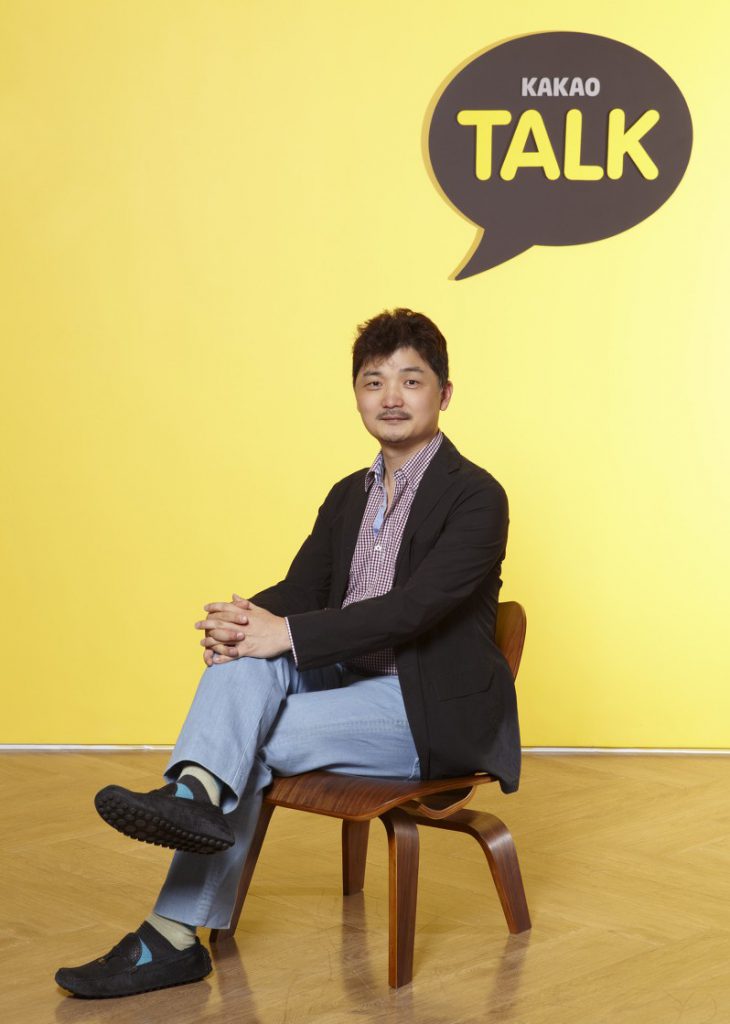by STEVE HAN
In South Korea, where every one of its top 10 richest people had abundance of inherited wealth to begin with, mobile messaging app KakaoTalk founder Kim Bum-soo is now one of the country’s richest billionaires as a rare self-made entrepreneur, according to Forbes.
Thanks to the recent merger between KakaoTalk, a South Korea-based free-for-all instant messaging application with 158 million registered users around the world, and Daum, the second largest Internet portal in the country, the 48-year-old is now worth at least $3.4 billion. Kim, who is a majority owner of the Kakao-Daum merger, owns 40 percent of the company that’s valued at $8.5 billion. Before the merger, Forbes Asia estimated his wealth at $960 million. Analysts expect that once the Kakao-Daum merger becomes listed on the South Korean Stock Exchange on Oct. 1, Kim’s stock assets will surpass a value of 1 trillion won.
Since its 2010 launch, KakaoTalk led hundreds of millions of smartphone owners around the world to choose its easy-to-use messaging system over the glitch-ridden SMS text messages. It also added additional features over the years, including gaming, shopping and social networking. Today, KakaoTalk reportedly earns 64 percent of its total revenue through games such as Anipang and Candy Crush. The company is one of a few mobile messaging services that turns a profit as its profits came in at $52 million last year.
KakaoTalk was inspired by Kim’s curiosity when he visited a friend’s business that sold a bulletin board system, a software that allowed communication between personal computers.
“That visit changed my life,” Kim recalled in a 2011 interview with Money Today. “It was a world that I never knew existed. Seeing how people were chatting with each other through their computers, it was my first experience of seeing a hyperlinked world. I spent the next three months observing and learning how computers work and decided that I will get a job at a company that had computers.”
Kim, whose parents raised him and his four siblings in a studio apartment, graduated Seoul National University in 1992 with a graduate degree in industrial engineering. An introvert with an obsession for card games, he left his job at Samsung’s information technology services division after working there for six years to found online gaming company Hangame, which merely digitized his favorite card and board games before revolutionizing South Korea’s now-ginormous online gaming industry.
 (Photo Credit: Tim Clayton/Corbis via Forbes)
(Photo Credit: Tim Clayton/Corbis via Forbes)
After tasting his first success as a self-made entrepreneur, Kim merged Hangame with Naver in 2000 and turned the merger into South Korea’s largest Internet portal which accounts for over 70 percent of all web searches.
But in 2007, Kim left Naver after differences with his partner over the direction of the business. A quirky father of two children, he would be out of work for two years. As he was entering the third year of his unemployment, he convinced his wife and teenage children to leave their education in the U.S. behind to return to Korea to “take a break.”
“I felt like I needed to find my inner desires back,” Kim said. “The things I like, things with value and meaning, were lost even as I was gaining financial wealth. My kids were in high school and middle school, but I figured it wasn’t a big deal to delay their college admission by a year. So we traveled and played billiards. I didn’t let them do anything else but play. We also went to the PC bang a lot. The four of us would play until 4 in the morning. I was so happy.”
Then, in 2009, Kim told his family: “I feel like I should work again.”
A year later, KakaoTalk was born. Identifying the rise of smartphone technology as an opportunity, Kim and his team offered the instant messaging service to replace the traditional SMS text messaging and incorporated additional gaming applications to generate revenue. KakaoTalk today is used by 93 percent of South Korea’s domestic smartphone users and 75 percent of the country’s entire population.
“I want KakaoTalk to be a platform for young people to freely spread their dreams,” Kim said in 2011. “Whether it’s music, books, videos or whatever content it may be, KakaoTalk lets users to share whatever they wish with anyone around the world. If I could leave the world as even a slightly better place than it was before me, that’s the truest success.”
Featured photo courtesy of Nate Pann





